3D printing can be used to make many things, and one area where users have found 3D printing especially useful is cosplay. There are lots of costumes that need a special sword to finish off the look, and again, 3D printing comes to the rescue. Hundreds, if not thousands, of 3D models of swords exist on online repositories.
3D printing allows for immense detail that looks flat-out amazing when painted and finished. Further, the interior of the swords can be modified to incorporate details that facilitate assembly or that make space for electronic components like lights. Fair warning though, 3D printed swords aren’t usually known for their strength, so don’t go charging into battle with them.
In this article, we’ll present you with a list of awesome 3D printed swords that you may recognize from books, video games, or movies, as well as some generic sword designs that were too good to pass up. For each selection, we’ll also go over a few printing and assembly tips.
If you or your 3D printer aren’t up to the challenge of a sword, try Craftcloud. Our 3D printing wizardry and talented “smiths” will forge your sword just to your tastes, and all you need to do is upload a model, followed by a few other clicks.
Let’s check out our list!
Slim
These first designs have a slim blade and can be wielded with one hand. They include a katana, a collapsible design, and some Star Wars-themed models as well!
Side Sword

The side sword is a great Renaissance-era sword with an interesting hilt design, a triangular blade, and a sharp tip. This sword uses 18 3D printed parts but isn’t completely printed, as it requires a few other components, including a wooden dowel (rod), a nut, and a bolt. These non-printed pieces help to hold the 3D printed parts together.
The only printing tip that the designer recommended was using supports for the guard and pommel parts. For more printing advice, you may want to check out a similar design.
- Who designed it? EternalMadHatter
- How printable/popular is it? This side sword has over 6,500 views as well as around 650 downloads.
- Where to find it? MyMiniFactory
Daedric Dagger
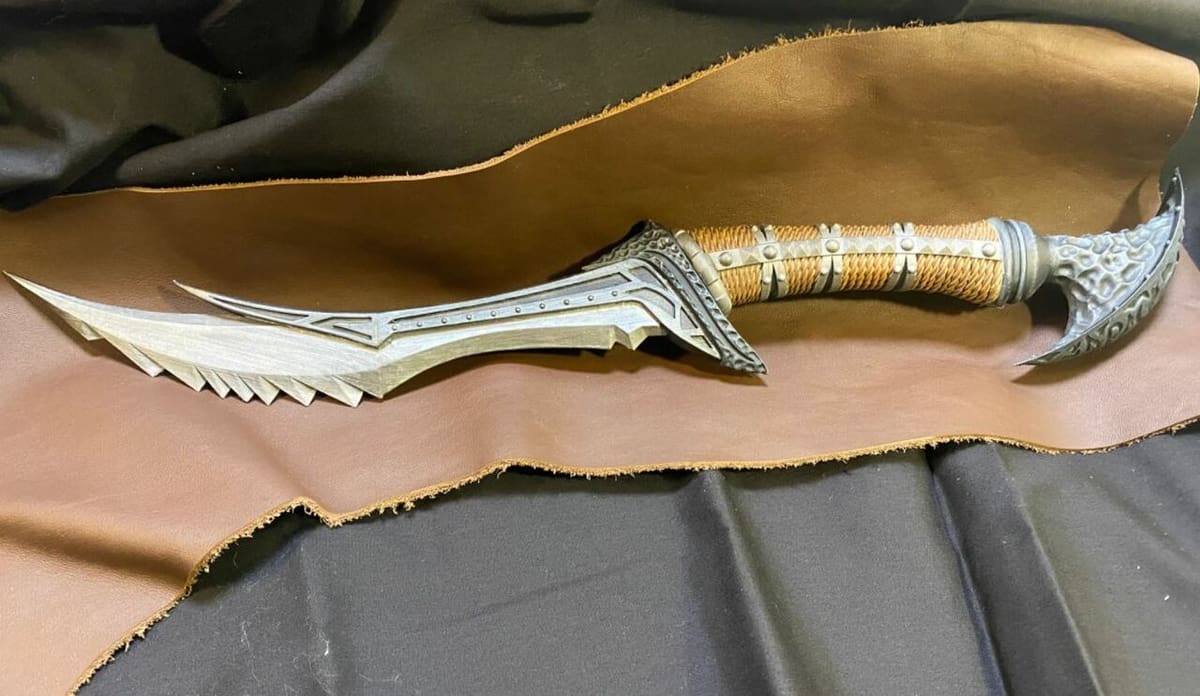
Not exactly a sword but still worth including, this is a model designed after the Daedric Dagger from the game The Elder Scrolls V: Skyrim. The model is comprised of eight pieces and has a rugged and curved design with many sharp points. As seen in the image above, painting and finishing the dagger makes it look very cool and realistic.
The designer provided a few of the print settings that they used to successfully print the model, making it easier for you to make one. The settings include a 0.12- to 0.2-mm layer height (depending on the part), a 25% infill density, and activated supports. The maker also noted that they printed the model in PLA.
- Who designed it? 3D_Printing_Maniac
- How printable/popular is it? This Daedric Dagger model has 6 makes and 1 remix with over 2,000 downloads.
- Where to find it? Thingiverse
Kylo Ren's Lightsaber
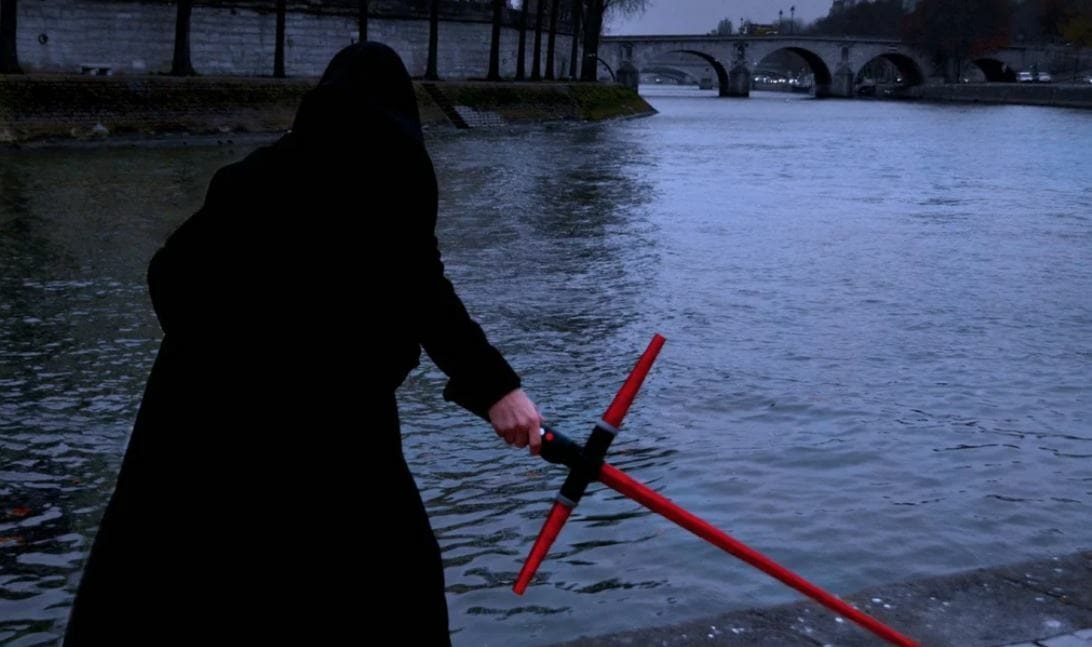
First appearing in the Star Wars: The Force Awakens, Kylo Ren’s lightsaber is one of the coolest lightsabers to date. If you’re unfamiliar with the special blade, it’s like a traditional lightsaber but with a cross piece above the handle. This model was designed from images in the movie trailer and contains over 40 pieces, which you can print in multiple colors to make it look closer to the one seen in the movies.
Assembling the printed parts should be pretty easy if you follow the designer’s Instructables page, which provides assembly as well as painting instructions. Though the designer printed the model in PLA with a 0.2-mm layer height, another maker achieved good results with a 0.2- to 0.3-mm layer height, 20% to 30% infill density, and supports deactivated.
- Who designed it? LeFabShop
- How printable/popular is it? This design of Kylo Ren’s lightsaber has 7 makes, 2 remixes, and almost 8,000 downloads.
- Where to find it? Thingiverse
Katana

Katanas are some of the coolest types of swords because of their sleek body, sharp blade, and long handle. This 3D printable katana project, designed by Dethu Guillaume and published by the Cults user lmbcruz, includes the katana, a sheath, and a display stand.
The katana itself is made up of 10 printable pieces, and you’ll also need some hardware, including a few M3 screws and threaded rods to connect the pieces securely. The threaded rods provide part-to-part strength, and the designer says that you should use glue to further ensure the blade’s structural integrity.
They also mention that you should consider sanding the pieces to make them smooth, using epoxy resin or repair putty to correct imperfections, and finishing them with spray paint.
Triton

This next model was designed after the Sword of Triton – Blackbeard’s broken sword from the Pirates of the Caribbean movies. The design is chopped up into six 3D printable pieces, and according to the designer, you can bond them using epoxy or superglue. The designer also says that you can fit a 36-inch metal rod with a 3/16-inch diameter through the center of the sword to strengthen it.
The maker mentioned that they printed the model with standard Prusa i3 MK2 settings. However, this might not help you that much because “standard” is a pretty broad term, and PrusaSlicer (assuming the maker used this slicer) occasionally changes their default slicing profiles. For this reason, we recommend checking out similar designs and their printing tips to get an idea of how you should go ahead this sword.
- Who designed it? TotallyAddicted
- How printable/popular is it? This model has over 30 downloads and 3 likes.
- Where to find it? Printables
Darksaber

You’ve probably seen the traditional lightsabers from the Star Wars saga, but this next sword is much rarer: the fabled Darksaber. If you’re a fan of The Mandalorian, you may have seen this sword, but it’s also featured in the animated series Star Wars: The Clone Wars.
This 3D printable Darksaber is collapsible and has fine detail that contributes to the cool aesthetic of the sword. The designer used a 0.2- to 0.3-mm layer height and a 20% infill density to bring the model to life. They also provided detailed print settings for a few of the larger pieces, which you can check out on the project page linked below. Also, make sure to use supports for the hilt end component (but they shouldn’t be necessary for the others).
- Who designed it? yeetkus
- How printable/popular is it? The Darksaber has 18 makes, 8 remixes, and over 12,000 downloads.
- Where to find it? Thingiverse
Elucidator
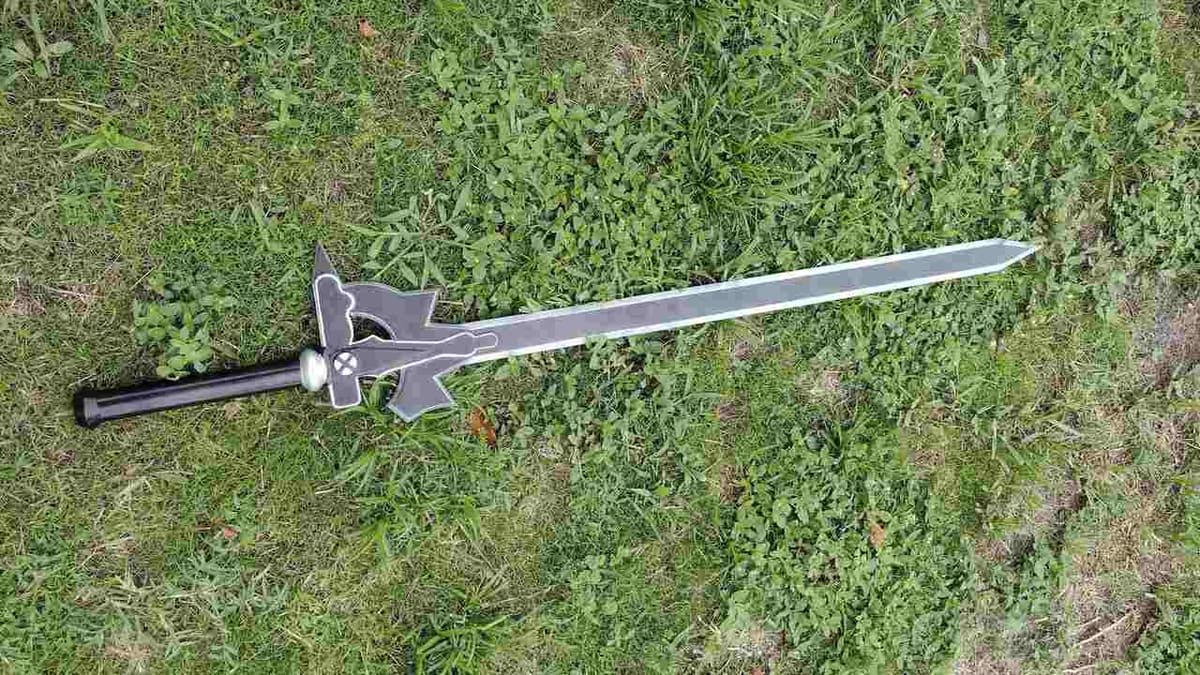
One of the most iconic swords to come out of any anime, the Elucidator is a fan-favorite from the Sword Art Online series. This life-sized model is the perfect addition to any cosplay and makes for a great decoration, too.
The file is divided into 11 pieces that should easily fit onto a standard-sized print bed. The designer even included notches to help with assembly, though they still recommend glue to keep everything together permanently. Many of the comments recommend increasing the size of the alignment pins to get a tighter fit.
Most of the files should have no issue printing without supports, though you may want to include a brim to prevent any curling. Due to the simple color scheme, you could opt to print your blade in black and use silver paint for the details.
- Who designed it? EthanNewhouse
- How printable/popular is it? This file is a great place to start if you’re looking for an easy and good-looking blade to print. Already, this file has seen 46,000 downloads! 36 makers have shared their prints of this model and 1 has shared their remix as well.
- Where to find it? Thingiverse
Kryptonite

There have been a number of swords made of either Kryptium or Kryponite in the DC universe, and this model is one maker’s unique take on it. The sword is very cool because it involves some electronic components that illuminate the blade in green (the color associated with Kryptonite). Even with the electronic components, the sword isn’t too bulky and has an elegant design for the hilt, which is where the electronics are stored.
The project requires 17 different 3D printed parts as well as a few M5 grub screws, LED strips, and a lithium-ion battery. The designer provided an in-depth guide for printing the sword, so making this print should be pretty straightforward. They stated that they printed the pieces in PETG and semi-flexible materials with three shells, a 30% infill density, and no supports.
- Who designed it? jmunkki
- How printable/popular is it? This Kryptonite sword has over 15,000 views as well as over 850 downloads.
- Where to find it? MyMiniFactory
Collapsible

Swords are not often considered a weapon of stealth, but this one is collapsible all the way down to the handle. This print-in-place model is a broadsword, but the designer has made a collection of other types of collapsible swords, too.
The sword extends to about 8.5 cm (a bit over 34 3/4 in) and collapses using concentric cylinders so that you can easily whip your wrist to extend it. As the concentric cylinders could bond during printing, the designer provided a test model, which we recommend printing before making the whole sword in order to not waste filament.
- Who designed it? 3DPrintingWorld
- How printable/popular is it? This collapsing broadsword has 32 makes, 5 remixes, and over 97,000 downloads! With so many makes posted, we think you can add your own to the list.
- Where to find it? Thingiverse
Narsil

Featured in The Lord of the Rings, Narsil is the shattered sword once used by Isildur to cut the ring from the hand of Sauron. This design is a remix from a model of Andúril – the sword forged from the shards of Narsil. As seen in the image above, painting and finishing the model really add a nice touch.
The designer didn’t provide any printing tips, but one maker listed a few that led to success. These slicer settings include a 0.12-mm layer height, a 10% infill density, and supports activated.
- Who designed it? namedjohnny
- How printable/popular is it? This Narsil design has 47 recorded makes, 8 remixes, and over 36,000 downloads! As there are so many recorded makes, it should be no problem finding help and printing tips to print your own version of this sword.
- Where to find it? Thingiverse
Omens

This next selection is the Sword of Omens from the animated series ThunderCats, and the model is a remix of the dagger form of the sword. This multi-part model has a well-designed long grip as well as cross- and rain-guards. This design has been updated a few times to improve the model’s look and printability.
The designer didn’t provide any printing tips to help you set your slicer settings, but there are several makes that contain a few helpful settings. One maker, who posted a great print of the sword in PLA, listed that they used a 25% infill density and no supports.
- Who designed it? omicron22
- How printable/popular is it? This Sword of Omens model has 23 makes, 4 remixes, and over 22,000 downloads!
- Where to find it? Thingiverse
Gladius

This sword design has major Ancient Greek and Roman vibes, with its straight double-edged blade and rounded pommel similar to a xiphos. Designed in SketchUp, the sword is split up into eight different parts that have cylindrical protrusions on one end and holes on the other so you can connect the parts. Despite the design, you’ll still need to use some glue, epoxy, or another adhesive to bond the parts, as the built-in connections won’t suffice.
In addition to bonding the parts with a strong epoxy, the designer recommends sanding and painting the pieces for a nice finish. While the designer doesn’t list any actual printing tips, one maker used a 0.3-mm layer height and a 20% infill density.
- Who designed it? samsve
- How printable/popular is it? The model has 14 makes, 5 remixes, and over 22,000 downloads!
- Where to find it? Thingiverse
DnD Dice Sword

Show up to your next Dungeons and Dragons session in style with this dice-holder sword. Designed to hold a standard set of dice, this is sure to get everyone’s attention.
The small design means this will easily fit in your pocket or bag for traveling between sessions. The sword prints in four different pieces that each slide into place. The designer still recommends glue to keep it together.
The sheath is designed to be printed in two colors, allowing you to customize the color of the leaf emblem on the sheath using multicolor systems or a simple filament swap. There’s also a version of the sheath without the leaf if you want a simple design.
You may need support for a few of the files, especially if your printer isn’t wide enough to print the blade on its side. Many makers have had issues with the pommel not adhering properly due to the tapered edge so a brim and support may be required for a good finish here. To complete the design, you may want some rope or cloth to wrap around the handle, as it is printed bare.
- Who designed it? Gdudud
- How printable/popular is it? This little sword has already been downloaded 7,000 times. 14 people have shared their makes and 2 have shared their remixes.
- Where to find it? Thingiverse
Bulky
These last sword designs are as large as a true warrior’s spirit. While they may be more decorative than practical, each one is undeniably impressive.
Master

The Master Sword is one of the most revered weapons in the Zelda game universe and is known under many names, including the Legendary Sword, Blade of Evil’s Bane, and more. In the game, the sword is huge and very bulky. At about 1.2 meters (around 47 1/4 in) long, this model doesn’t shy away from its inspiration’s size.
To make the weapon more printable, the sword is split into 11 3D printed pieces that connect via built-in dowel joints. The designer printed the model with a 0.2-mm layer height and a 10% infill density, which consumed about 560 grams of filament. Some makers mentioned that they also glued the components together, most likely for extra strength.
- Who designed it? Skeletonbolts
- How printable/popular is it? This Master Sword design has 6 community prints, over 80,000 views, as well as over 7,000 downloads!
- Where to find it? MyMiniFactory
Frostmourne

This is a model of Frostmourne from the World of Warcraft, which was the runeblade that belonged to the Lich King. The model’s designer used SolidWorks, ZBrush, and Autodesk MeshMixer to combine solid body and organic modeling, thereby creating the detailed features of the sword. The model was designed to be printed in 12 pieces, which are assembled using slots and joints rather than glue.
The designer stated that they printed the sword with the standard 0.2-mm layer height alongside a 10% infill density, saving some filament for a project this big. One community maker also posted a great design in PLA and listed that they used two shells.
- Who designed it? Kirby Downey
- How printable/popular is it? This model of Frostmourne has 4 community prints and over 23,000 downloads, as well as over 200,000 views!
- Where to find it? MyMiniFactory
Ekko's Sword
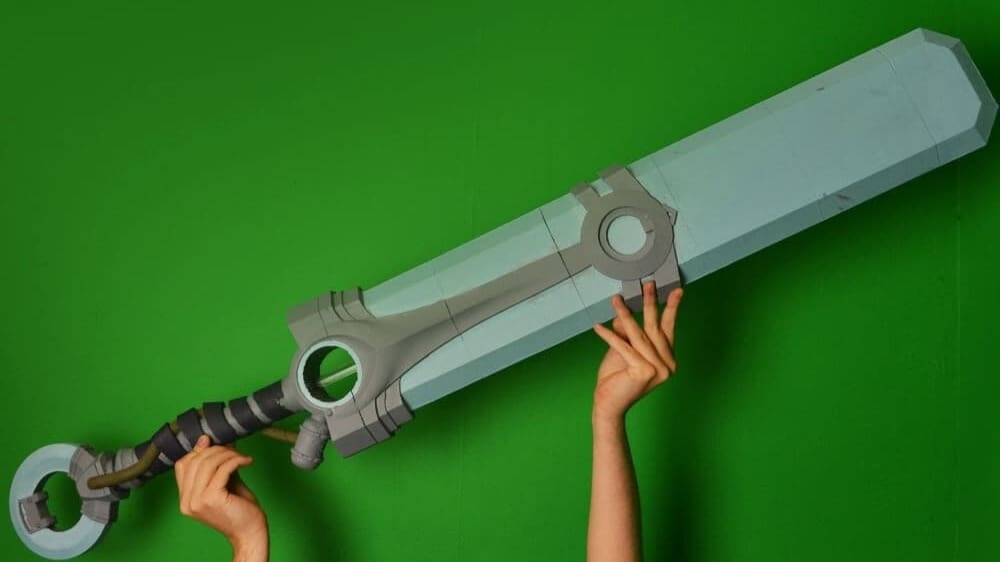
Whether you’re a longtime League of Legends player or you’re anticipating the return of the Arcane series on Netflix, you might be very familiar with this next blade.
This rendition of Ekko’s sword has just enough detail to look great while maintaining a simple and easy-to-print design. For printing, the model has been divided into 10 parts, each of which should fit just fine on a standard 3D printer bed. The designer has left instructions and a supply list in the description for all of the support rods they used during assembly.
If you would like a more visual approach to the assembly instructions, you will also find a video of the build in the description as well. This is another great build for those who aren’t too confident in painting their props, as you won’t need to do much to get this model to look awesome. The designer also posted a 30-cm version of the design for those who’d want this look to be mobile.
- Who designed it? fntsmn
- How printable/popular is it? Over 26,000 people have stopped to view this file, with 1,700 downloading the files and 1 sharing their make.
- Where to find it? MyMiniFactory
Guardian
Next up is a model of the Guardian Sword wielded by Link in The Legend of Zelda: The Breath of the Wild. This model captures the awesomeness of the sword, containing 11 3D printed parts, a battery, some small circuit boards, and over 90 NeoPixel lights, which illuminate parts of the blade. If that seems like a lot, don’t worry – Adafruit provides a detailed guide with instructions.
Although the designer didn’t provide any printing tips, one maker posted a great model and shared that they used a 0.1-mm layer height. And given the lack of overhangs and the model’s footprint, neither supports nor a raft should be necessary.
- Who designed it? adafruit
- How printable/popular is it? This Guardian Sword model has 27 makes, 6 remixes, and over 41,000 downloads! Many people have posted successful prints, indicating that you can print this model, too!
- Where to find it? Thingiverse
Blades of Chaos

God of War took the gaming world by storm in the last couple of years, being one of the most anticipated games we’ve seen in a while. These replica swords are a great way to commemorate your time with the game.
Printed in seven parts, the file for the Blades of Chaos is a great, high-detail print that should give you no trouble. The designer went to great lengths to sculpt all of the cracks and textures that make this model stand out.
A 5-mm rod is used to hold the pieces together, helping with alignment and strength. To complete the look of your build, you can add your own chain as well. The files are designed to use as little support as possible.
While not required, this print truly shines with a nice paint job. Even something as simple as a nice dark wash over the textured areas can do wonders for the finished prop.
- Who designed it? KirbyDowney_65
- How printable/popular is it? This model has been viewed over 6,000 times, with 900 downloads and a make that showcases another way you could paint your swords!
- Where to find it? Printables
Halo

If you’ve ever played any of the Halo video games, you’re probably familiar with the Energy Sword, the close-combat weapon of certain alien soldiers of the Covenant Empire. The sword is supposed to use light energy to destroy its wielder’s opponents, and this 3D printable version simulates this feature with LEDs.
This model was designed by the Ruiz Brothers at Adafruit and uses NeoPixel LEDs, a battery, and some small electronic boards to function. The sword’s design is divided into 14 different pieces, and Adafruit has a complete guide for printing the pieces and assembling the electronics on their website.
In their guide, the designers recommend printing the parts with a 50-mm/s print speed and activating supports for the front and back handles. One maker also listed a 0.18- to 0.25-mm layer height and a 30% infill density for their print settings.
- Who designed it? adafruit
- How printable/popular is it? This model has 14 makes, 4 remixes, and over 29,000 downloads!
- Where to find it? Thingiverse
Dragonslayer
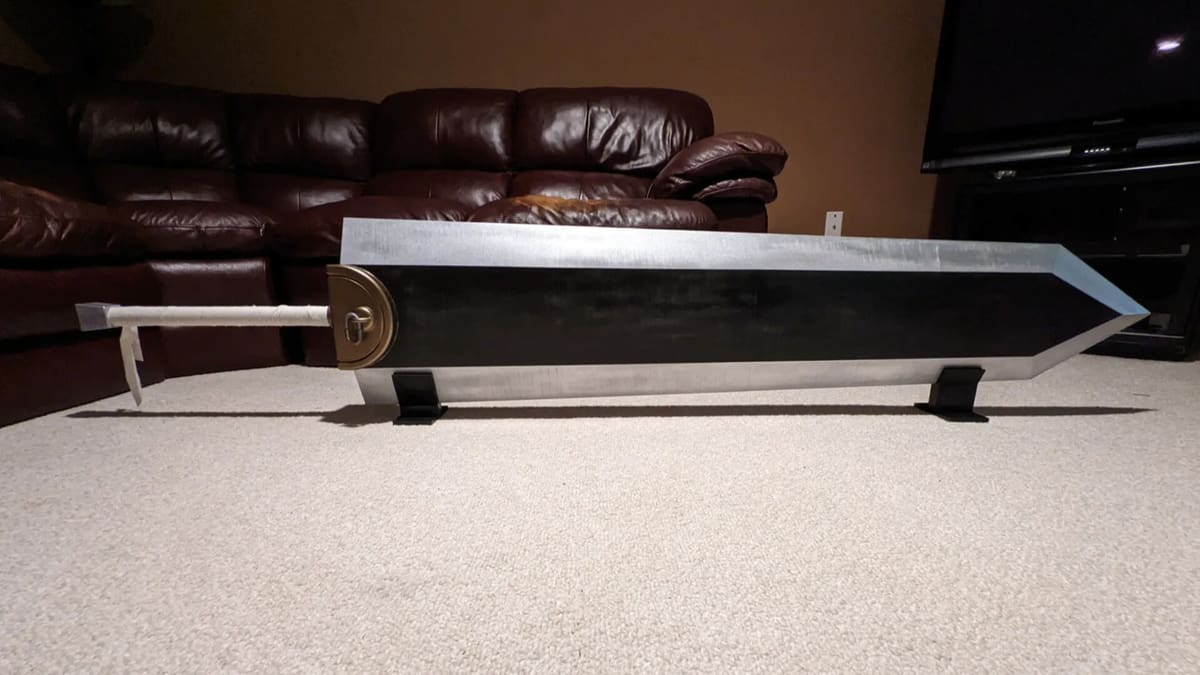
Lastly, we have a very well-known sword in the anime community of Dragonslayer. This model is nearly a 1:1 replica of the Berserk greatsword and makes an epic a 3D printed sword.
This is a very large, very tall print. Luckily, the designer included two different versions, one with horizontal cuts and one with center cuts for smaller printers.
For assembly, you can look in the description for a very detailed step-by-step process that includes the additional support rods needed for a print this size. The guide even goes as far as to show you how the original designer painted their sword!
Speaking of paint, a very simple three-color job with some common spray paints and masking tape will get the job done. If you aren’t sure what paints to use, there are several recommendations in the comments section.
- Who designed it? Delphant
- How printable/popular is it? With 600 downloads and 2 makes, you can be sure this is a blade worth making. Expect to use around five spools of filament!
- Where to find it? Printables
License: The text of "3D Printed Sword: 20 Epic Models to 3D Print" by All3DP is licensed under a Creative Commons Attribution 4.0 International License.





